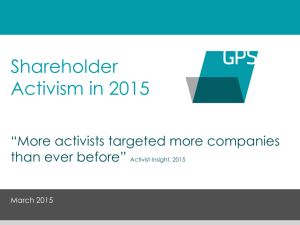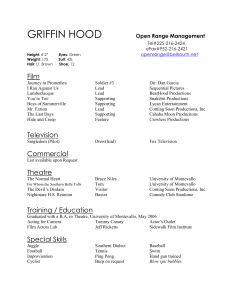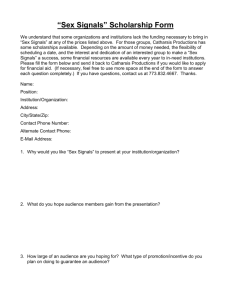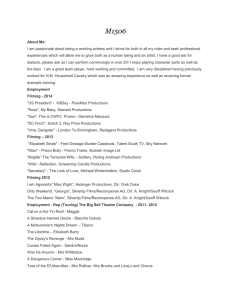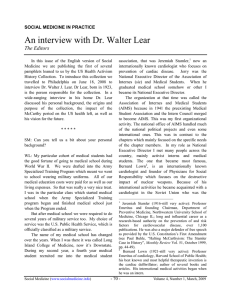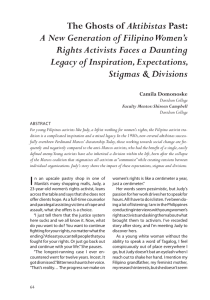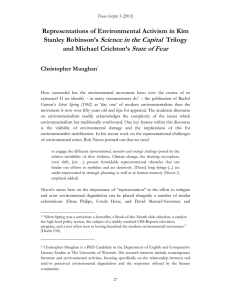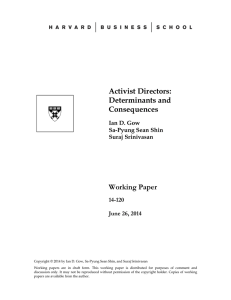Creative Communication and Climate Activism
advertisement
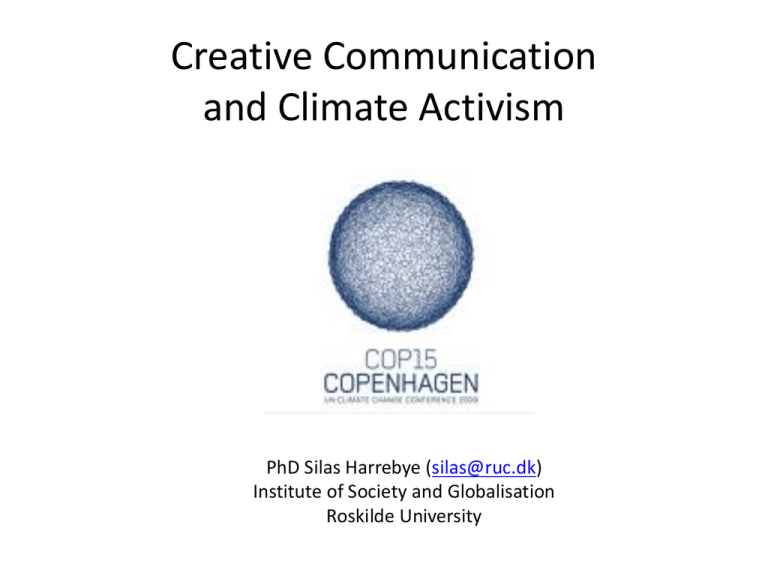
Creative Communication and Climate Activism PhD Silas Harrebye (silas@ruc.dk) Institute of Society and Globalisation Roskilde University The Discursive Huddle “Radical activists shall not make a fool of the police force. The police can easily take care of such a bunch of radicals. Even if there are many of them, they are not very bright. I mean, they did not invent very many sharp knifes… in the drawer. And they are not very strong either. They are high and stoned. They are drunk. And so on. Therefore the police can easily control them” (Danish Minister of Justice at the time Brian Mikkelsen) “As long as we are talking about peaceful people demonstrating (…) we do not have a problem with them. But it is something else with those who have a different agenda. Those people I will call activists” (Flemming Steen Munch, Vicepoliceinspector and chief of information, Copenhagen Police) 1. The Militant Activist Logic of violence “Relations between challengers and authorities are turned from a confused many sided game into a bipolar one in which people are forced to chose sides allies defect, bystanders retreat, and the states’ repressive apparatus swings into action“ (Tarrow) 2. The Confrontational Activist Logic of disclosure ”These activists are revealing the true colours of the representative democracy’s force to the public” (Klein) 3. The Creative Activist Logic of the outsider Tentative definition: Creative activism can tentatively be defined as a civic citizenship participation where critical perspectives on a societal issue or a political system are communicated in creative ways through a strategic political happening characterized by an ironic attitude in order to provoke reflection in the public sphere – and as such it must be seen as a reaction to the dominant political rationale and the medialised public in which it thrives 4. The Professional Activist Logic of lobbyism “Mostly, they want to be taken seriously as prudent and competent partners who have a wide conception of the political as a discursive construct. Therefore they also tend to place negotiation and dialogue before antagonism and opposition” (Bang) 5. The Occational Activist Logic of numbers “The logic underlying such action is totally coherent with the principles of representative democracy: An attempt is made to influence public opinion, the final repository of political power ” (Porta and Diani) 6. The Everyday-Maker Logic of do-it-yourself “They prefer to be involved as reflexive individuals participating with other reflexive individuals for getting a particular and very concrete project going, right where they are (…) They aim to encourage more spontaneous and lowly organized forms of involvement than those of expert citizens, who typically will seek to professionalize all ‘spontaneity’” (Bang) From Category to Jam Session “These varieties of action constitute a repertoire in something like the theatrical or musical sense of the word; but the repertoire in question resembles that of commedia dell’ arte or jazz more than that of strictly classical ensemble: people know the general rules of performance more or less well and vary the performance to meet the purpose at hand” (Tilly) Operating in a Media Paradox “The attention paid to the immediate impact of symbols seeks to facilitate the diffusion of the social movement message in a situation where the media tends to report superficially: ‘If the message is embedded in the activity, then a report of the activity makes people think about the issue as well” (Rochon) Wooloo Productions Participatory network online with over 13.000 members in over 140 countries Festivals of hospitality The private summit “New Life Copenhagen is promoted as “an art festival and social experiment that takes place in thousands of Danish homes during the United Nations Climate Change Conference” (http://www.wooloo.org/festival) “Rather than traditional activism I would characterize the work that we do as social design or social architecture. Through the framing of specific social scenarious we allow people physically, not only through discourse, to experience and explore new ways of living together” (Sixten, Co-Director of Wooloo Productions) A platform “By using artistic, performative, and narrative means we turn New Life Copenhagen into something more than a housing project” (http://www.wooloo.org/festival) – Cokenhagen (with The Yes Men) – Ecological Burial (with Superflex) – Climate Justice Fast (with hungerstriking activists) – Etc. Creative activism? “We opererate as cameleons in a nomadic discourse across disciplines” (Martin, Co-Director of Wooloo Productions) ”Earlier you produced beauty. Now we are – only – taking point of departure in the beautiful or creative production” (Martin, Co-Director of Wooloo Productions) Inside or outside? “What is stressed in mainstream participatory models is never that lay people can make a real difference to the structuration of the political regime from inside the political system. The focus is always on how people orient themselves to government from outside in civil society, whether actively, as virtuous citizens, or passively, as obedient subjects” (Bang s. 118) On one hand… “Civility now has to be entrenched globally before it can be guaranteed nationally and locally, but the guarantors of civility in the old national state, a legal system, rights, a judiciary, police, political representation and administration under the law, have no global equivalents. Democratic behavior then has to be lodged at a deeper level than in institutions alone” (Albrow and Glacius) On the other… • “The greater the opportunities of access to the decision-making system, the more social movements tend to adopt moderate strategies and institutional channels” (Porta) Systematic Integrative Mechanisms? “The difference is that we are put in a rather fixed situation where we are limited by the official framing. We like to work the other way around and challenge the space in which we interact – as citizens, as lovers, consumers, friends, etc. So, our possible participation in officially staged fora, whether advisory boards or policy innovation commissions, depends on how I would be treated, positioned, used, and instrumentalized. We would have to be taken serious and not just be the funny clowns – which I believe is a real risk in such a situation” (Sixten, Co-Director of Wooloo Productions) Why? “Our creative approach to activism largely depend on the rules and the framing that we construct as a conscious and productive constraint for our social sculptures” (Sixten, Co-Director of Wooloo Productions) Political or cultural phenomenon? “In contrast to traditional art festivals and biennials, our aim with the NEW LIFE festival concept is not to represent a set of cultural conclusions, but to create a model for a fluid cultural landscape” (http://www.wooloo.org/festival/about) “We aim beyond the traditional art exhibition to become an active organizer of experiments in civic engagement and social empowerment” (http://www.wooloo.org/festival/about) “What is political is very much in the eye of the beholder, and what is regarded as legitimately political is policed by the state. To analyze politics and political participation, we need to rethink the claim that individuals who do not participate in politics in conventional, orthodox ways are politically apathetic” (Marsch et al.) “Critical? We are critical in our own way through a poetic approach. We try to vary our critique so it is dressed up in different garments. But overall critique of the nation state, of immigration policies, of capitalism, of individualisation and use of resources is a central motivation in our work. We try to deliver it in a way that is entertaining, experimental, and challenging. Because we want to reach people and get them engaged” (Sixten, Co-Director of Wooloo Productions) Effects of Creative Communication? What is the aim? Change of policies, or A critical collective consciousness and a development of a deep democratic culture Pessimists: ”Just a drop in the ocean!” Optimists: ”Like rings from a drop in the ocean change will come slowly” Creative Communication and Climate Activism PhD Silas Harrebye (silas@ruc.dk) Institute of Society and Globalisation Roskilde University
